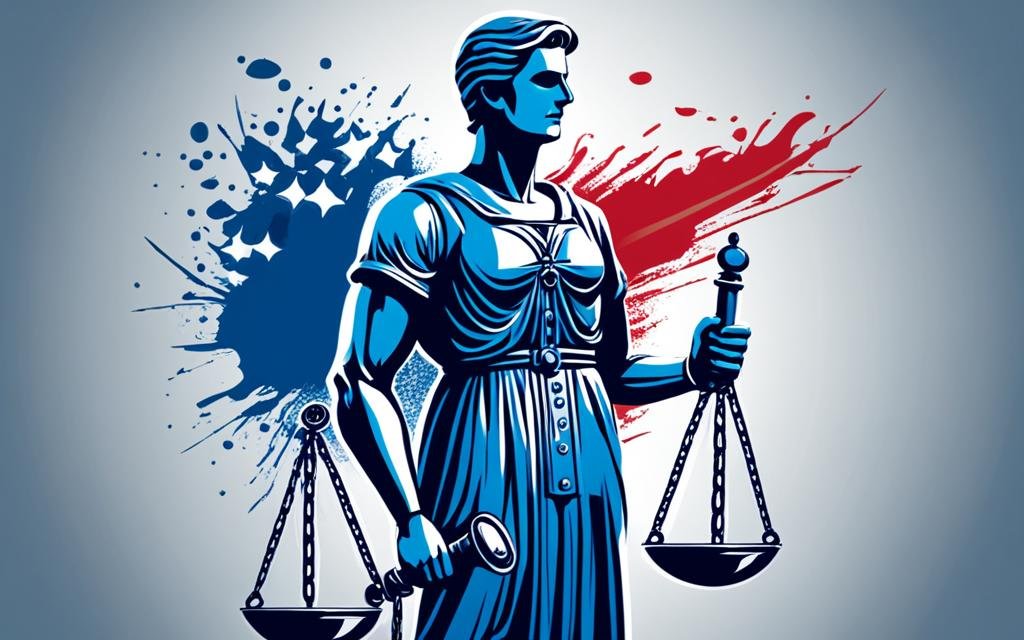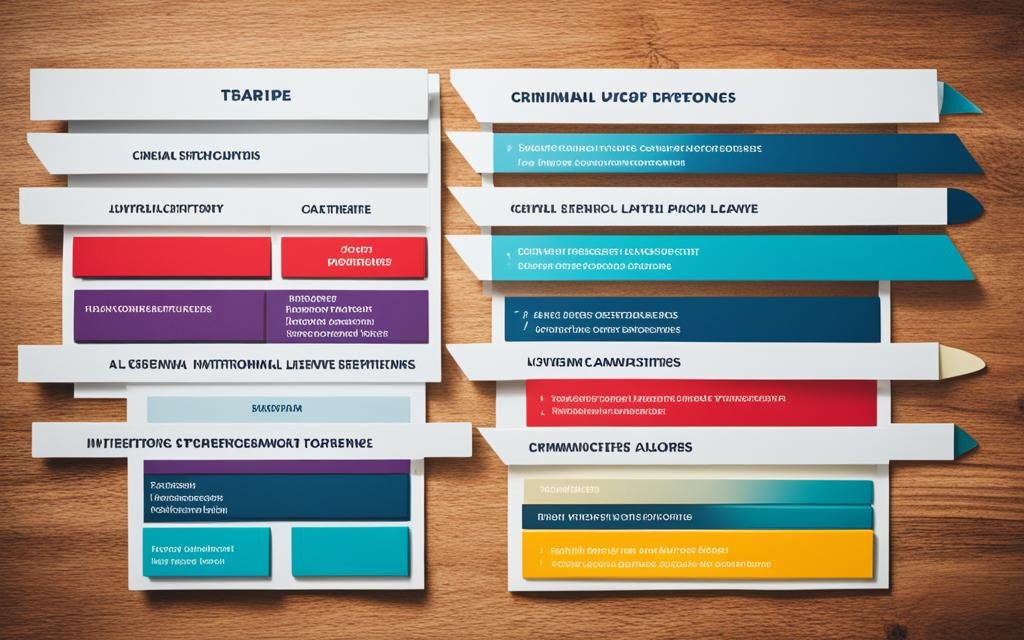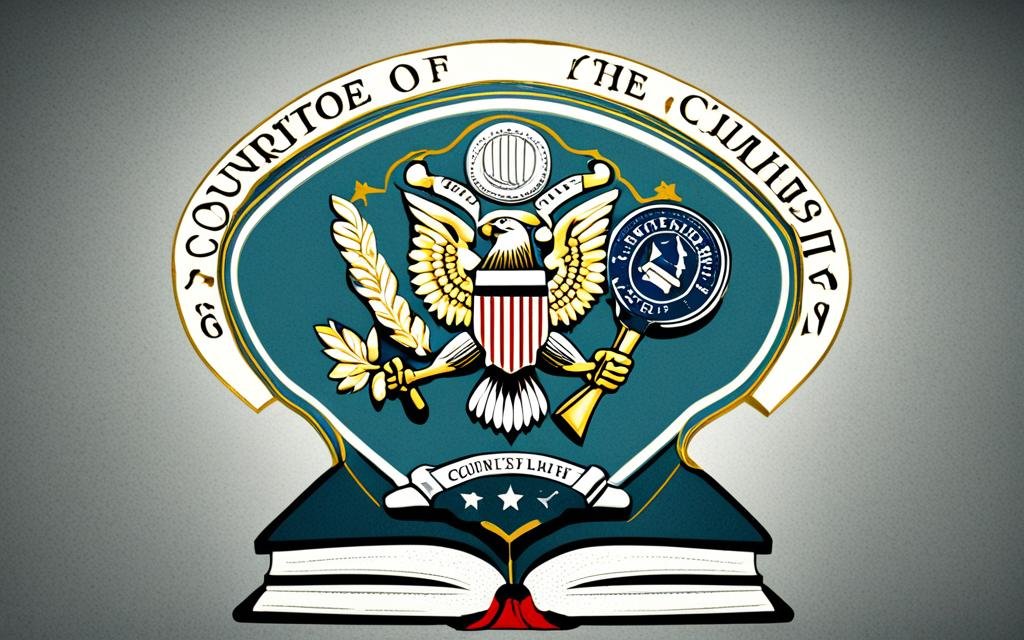As an individual facing the complexities of criminal cases, it is crucial to understand and protect your legal rights. Navigating the legalities within the criminal justice system can be daunting, but having the knowledge and guidance to safeguard your rights is essential. With the right information and resources, you can ensure a fair and just process as you navigate through the legal intricacies of criminal cases.
In this article, I will provide valuable insights into the world of criminal cases, offering guidance on understanding legal rights, seeking legal representation, and comprehending the roles of law enforcement and prosecutors. I will also delve into the various stages of a criminal trial, explore defense strategies, and shed light on the consequences of criminal convictions beyond sentencing.
Whether you are currently facing criminal charges or simply seeking knowledge to protect yourself and your loved ones, this article aims to equip you with the information you need to navigate the legal complexities of criminal cases confidently.
Key Takeaways:
- Understanding your legal rights is crucial when dealing with criminal cases.
- Seeking legal representation is vital to ensure your rights are protected.
- Law enforcement and prosecutors play significant roles in the criminal justice system.
- Knowing the various stages of a criminal trial can help you navigate the legal process more effectively.
- Defense strategies and evidence can significantly impact the outcome of your case.
Understanding Legal Rights in Criminal Proceedings
In the realm of criminal proceedings, it is crucial for individuals to have a comprehensive understanding of their legal rights. These rights serve as the foundation for safeguarding oneself throughout the criminal justice process, from arrest to trial. By knowing and asserting their rights, individuals can ensure fair treatment and a just outcome.
The Importance of Knowing Your Constitutional Rights
Constitutional rights form the bedrock of legal protection in criminal cases. These rights, guaranteed by the United States Constitution, serve as a powerful shield against any infringement upon an individual’s liberty. Familiarity with these rights enables individuals to challenge any action that violates these fundamental principles.
What are Miranda Rights and How Do They Protect You?
One essential aspect of constitutional rights is the concept of Miranda rights. Named after the landmark Supreme Court case Miranda v. Arizona, these rights ensure that individuals who are in custody are informed of their rights to remain silent, have an attorney present during questioning, and have their statements used against them in court. Miranda rights protect individuals from self-incrimination and provide important safeguards during police interrogations.
Ensuring Your Rights are Upheld from Arrest to Trial
From the moment of arrest to the final verdict in a trial, it is essential that individuals’ legal rights are upheld. These rights include the right to a fair and speedy trial, the right to be presumed innocent until proven guilty, the right to confront witnesses, and the right to legal representation. Understanding and asserting these rights is vital for securing a just outcome in criminal proceedings.
| Constitutional Rights | Role |
|---|---|
| The right to remain silent | Protects individuals from self-incrimination during police interrogations |
| The right to an attorney | Ensures individuals have legal representation during questioning and throughout the criminal justice process |
| The right to a fair and speedy trial | Guarantees a timely and impartial trial free from undue delays or prejudice |
| The right to be presumed innocent until proven guilty | Places the burden of proof on the prosecution to establish guilt beyond a reasonable doubt |
| The right to confront witnesses | Allows individuals to challenge the credibility and reliability of witnesses testifying against them |
| The right to legal representation | Ensures individuals have access to legal counsel for advice, guidance, and representation |
Your Legal Rights in Criminal Cases: Critical Aspects You Need to Know
When facing criminal charges, understanding your legal rights is crucial for safeguarding your interests and ensuring a fair trial. This section highlights critical aspects of legal rights that individuals need to be aware of in criminal cases.
1. Presumption of Innocence: In the criminal justice system, every individual is considered innocent until proven guilty. This principle places the burden of proof on the prosecution to show that the accused is guilty beyond a reasonable doubt.
2. Burden of Proof: The burden of proof lies with the prosecution to establish the guilt of the accused. They must present convincing evidence that proves the accused committed the alleged crime.
3. Right to Legal Representation: One of the most critical aspects of legal rights is the right to legal representation. You have the right to seek the counsel of an attorney who can provide guidance, protect your interests, and present your case effectively.
During the investigation stage:
- You have the right to remain silent and not incriminate yourself.
- If you are arrested, you have a right to be informed of the charges against you.
4. Right to a Fair Trial: You have the right to a fair and impartial trial. This includes the right to call witnesses, present evidence, cross-examine witnesses, and testify on your own behalf, if desired.
During the trial stage:
- The prosecution must prove your guilt beyond a reasonable doubt.
- You have the right to challenge the evidence presented against you and question the credibility of witnesses.
5. Right to Due Process: The concept of due process ensures that individuals are treated fairly and consistently under the law. It includes the right to a timely and public trial, the right to confront witnesses, and the right to present a defense.
During the sentencing stage:
- You have the right to be informed of the potential consequences and punishment you may face.
- You have the right to be heard during the sentencing process and present mitigating factors that could influence the outcome.
Understanding these critical aspects of legal rights is essential for navigating the complexities of the criminal justice system and ensuring the protection of your interests throughout the legal proceedings.

Seeking Legal Representation: When to Hire a Criminal Defense Attorney
When facing criminal charges, it is crucial to seek legal representation to navigate the complexities of the legal system. A skilled criminal defense attorney plays a pivotal role in safeguarding your rights and mounting an effective defense.
Role of Legal Counsel in Defending Your Rights
A criminal defense attorney serves as your advocate and guide throughout the legal process. They have a deep understanding of criminal law and are equipped to handle the intricacies of your case. Their primary role is to protect your rights and ensure fair treatment at every stage, from investigation to trial.
A defense lawyer will thoroughly assess the evidence against you, identify any legal errors, and develop a robust defense strategy tailored to your specific circumstances. They will represent you during negotiations with the prosecution, advise you on the potential consequences, and fight to secure the best possible outcome for your case.
Criteria for Choosing the Right Criminal Defense Lawyer
Choosing the right criminal defense lawyer is a critical decision that can significantly impact the outcome of your case. Consider the following criteria to help you make an informed choice:
- Experience: Look for an attorney who specializes in criminal defense and has a successful track record handling cases similar to yours.
- Expertise: Ensure the lawyer has in-depth knowledge of the specific laws and legal processes relevant to your case.
- Communication: Select an attorney who communicates effectively, listens attentively, and keeps you informed about the progress of your case.
- Reputation: Research the lawyer’s reputation by seeking referrals, reading reviews, and considering their standing in the legal community.
- Personal Connection: Trust and compatibility are crucial. Choose a lawyer with whom you feel comfortable discussing sensitive details and who demonstrates genuine concern for your well-being.
How a Public Defender Can Aid Your Case
If you cannot afford a private defense attorney, you may be eligible for a public defender provided by the government. Public defenders are dedicated legal professionals who represent individuals who cannot afford legal representation.
Public defenders possess the necessary skills and knowledge to provide competent legal counsel. While they may handle a heavier caseload than private attorneys, they are still committed to defending your rights and achieving the best outcome for your case.
It is essential to have legal representation by either hiring a criminal defense attorney or seeking a public defender. They will fight for your rights, navigate complex legal procedures, and advocate for your best interests throughout the criminal justice process.
Examining the Role of Law Enforcement and Prosecutors in Criminal Law
In the realm of criminal law, the roles of law enforcement and prosecutors are pivotal in ensuring a fair and just legal system. Law enforcement agencies, including police departments and federal agencies, play a crucial role in investigating crimes, apprehending suspects, and gathering evidence. Prosecutors, on the other hand, are responsible for presenting the case against the accused and seeking justice on behalf of the society.
The role of law enforcement is multifaceted, encompassing various responsibilities such as maintaining public order, preventing and deterring criminal activities, and protecting the rights and safety of individuals. Through their investigative efforts, law enforcement agencies collect evidence, interview witnesses, and build cases that can withstand scrutiny in court. Their dedication to upholding the law forms the foundation for a fair and impartial criminal justice system.

Prosecutors, on the other hand, play a critical role in the criminal justice process. As legal professionals representing the state or federal government, they have the responsibility to evaluate cases, determine charges, and decide whether to pursue criminal charges against an individual. Prosecutors have a dual role of seeking justice and protecting the rights of victims by presenting compelling evidence in court to prove guilt beyond a reasonable doubt.
Furthermore, prosecutors have a duty to ensure the integrity of the criminal justice system by disclosing all relevant evidence to the defense and upholding the principles of fairness and due process. They play a pivotal role in negotiating plea deals, representing the interests of the state, and advocating for appropriate sentencing during trial proceedings.
The actions and decisions of both law enforcement and prosecutors can significantly impact an individual’s rights, defense strategies, and ultimately, the outcome of a criminal case. Their adherence to legal and ethical standards is paramount in preserving the integrity of the criminal justice system and safeguarding the rights of all parties involved.
Navigating Criminal Court Procedures: From Arraignment to Verdict
In a criminal trial, it is essential to understand the various stages and procedures that make up the court process. From the initial arraignment to the final verdict, each step plays a significant role in determining the outcome of the case.
Understanding the Steps in a Criminal Trial
A criminal trial typically consists of several key steps, each serving a specific purpose in the legal proceedings. These steps include:
- Arraignment: During the arraignment, the defendant is formally charged with the alleged crime(s). They enter a plea of guilty, not guilty, or no contest.
- Pretrial Proceedings: This stage involves the exchange of evidence and information between the prosecution and defense. It may also include pretrial motions, such as requests to suppress evidence or dismiss the case.
- Jury Selection: If the trial is to be decided by a jury, this is the stage where potential jurors are selected through a process known as voir dire.
- Opening Statements: Both the prosecution and defense present an outline of their case to the jury, outlining the evidence they plan to present and the arguments they will make.
- Presentation of Evidence: The prosecution presents their case, calling witnesses and introducing physical evidence. The defense has the opportunity to cross-examine these witnesses and present their own evidence.
- Closing Arguments: Both sides summarize their case, highlighting key points and attempting to persuade the jury to rule in their favor.
- Jury Deliberation: The jury considers the evidence and arguments presented and reaches a verdict of guilty or not guilty. If the jury cannot reach a unanimous decision, it results in a hung jury.
- Verdict: The final outcome of the trial, where the jury declares the defendant either guilty or not guilty. If found guilty, the defendant proceeds to the sentencing phase.
Key Hearings and Their Significance in Your Defense
Throughout a criminal trial, there are several key hearings that have a significant impact on the defense. These hearings include:
- Bail Hearing: Determines whether the defendant should remain in custody or be released on bail pending trial.
- Preliminary Hearing: Determines if there is enough evidence to proceed to trial or if the charges should be dismissed.
- Motion Hearings: Address various legal issues, such as the admissibility of evidence, requests for change of venue, or suppression of statements.
- Sentencing Hearing: Occurs after a guilty verdict is reached, where the court determines the appropriate punishment for the defendant.
Each of these hearings provides an opportunity for the defense to challenge the prosecution’s case, present evidence, and argue for a favorable outcome for the defendant.
To navigate the complex world of criminal court procedures effectively, it is crucial to have the guidance of a skilled defense attorney who can navigate each stage of the trial and protect your rights.
The Anatomy of Criminal Defense Strategies
In criminal cases, the strategic approach to defense plays a critical role in protecting the rights of the accused individual. Criminal defense strategies encompass a wide range of methods and techniques employed by defense attorneys to build a strong case on behalf of their clients. These strategies aim to challenge the prosecution’s evidence, attack the credibility of witnesses, and ultimately seek a favorable outcome for the defendant.
Common Defense Theories Used in Criminal Cases
Defense theories form the foundation of criminal defense strategies. These theories provide a framework for presenting alternative explanations or casting doubt on the prosecution’s version of events. Some common defense theories used in criminal cases include:
- Self-defense: This theory argues that the defendant acted in self-defense to protect themselves from imminent harm or danger.
- Alibi: An alibi defense asserts that the defendant was not present at the scene of the crime and can provide evidence to prove their absence.
- Insanity: The insanity defense asserts that the defendant should not be held criminally responsible for their actions due to a mental illness or defect at the time of the offense.
- Mistaken identity: This defense theory claims that the defendant was wrongly identified as the perpetrator and bears no involvement in the crime.
How Evidence Can Shape the Outcome of Your Case
Evidence plays a pivotal role in criminal cases and has the power to significantly impact the outcome. Both the prosecution and the defense gather and present evidence to support their respective positions. Strong evidence in favor of the defense can undermine the prosecution’s case, create reasonable doubt, and ultimately lead to an acquittal or a reduction in charges.
Defense attorneys meticulously analyze the evidence presented by the prosecution, identify weaknesses or inconsistencies, and work to challenge its credibility. They may also gather their own evidence, such as expert testimonies, surveillance footage, or alibi witnesses, to corroborate the defense theory and strengthen their client’s position.
In some cases, the defense may choose to introduce affirmative evidence, which directly contradicts the prosecution’s evidence, to establish a different narrative or present an alternative explanation.

By skillfully navigating the complexities of evidence in a criminal case, defense attorneys aim to create doubt and present a strong defense theory that favors their client.
Consequences of Criminal Convictions: Beyond Sentencing
In addition to the immediate sentencing, criminal convictions can have long-lasting repercussions that extend far beyond the courtroom. These consequences can have a profound impact on various aspects of an individual’s life, affecting their employment opportunities, social interactions, and overall quality of life.
The Long-Term Impact of a Criminal Record
One of the most significant consequences of a criminal conviction is the presence of a permanent criminal record. This record can follow individuals for the rest of their lives, potentially hindering their ability to find employment, secure housing, and access certain educational opportunities.
A criminal record can act as a barrier to employment, as many employers conduct background checks as part of their hiring process. This means that individuals with criminal convictions may face limited job prospects and increased difficulty in supporting themselves and their families.
Furthermore, a criminal record can also lead to social stigma and discrimination, causing individuals to face judgment and prejudice from others in their communities. This social stigma can result in feelings of isolation, low self-esteem, and an overall diminished quality of life.
Dealing with the Aftermath: Employment and Social Stigma
While the consequences of a criminal conviction may seem daunting, it is important to remember that individuals can take steps to mitigate these challenges and rebuild their lives. Here are some strategies for navigating the aftermath of a criminal conviction:
- Seeking Expungement: Depending on the jurisdiction and the nature of the offense, individuals may be eligible to have their criminal records expunged or sealed. Expungement removes or hides the criminal record from public view, providing individuals with a fresh start and increased opportunities for employment and social integration.
- Obtaining Professional Support: It can be beneficial to seek guidance and support from professionals who specialize in helping individuals with criminal records. This includes organizations that offer job placement assistance, counseling services, or legal advice on navigating the challenges associated with a criminal record.
- Building a Strong Support Network: Surrounding oneself with friends, family, and supportive individuals can greatly contribute to overcoming the difficulties that arise from a criminal conviction. A strong support network can provide encouragement, understanding, and resources to help individuals rebuild their lives.
By taking these proactive steps, individuals can empower themselves to overcome the challenges and limitations brought about by a criminal conviction. It is important to remember that while a criminal record may have long-term consequences, it does not define a person’s worth or potential. With persistence, resilience, and a supportive network, individuals can move forward, rebuild their lives, and create a brighter future.
Legal Rights Protection: Preparing for Appeals and Post-Conviction Remedies
In the unfortunate event of a conviction, individuals still have legal rights protection available to them. This section will discuss the crucial steps to prepare for appeals and post-conviction remedies. By understanding and exercising these options, individuals can seek relief or challenge a conviction, ensuring that their rights are upheld.
One of the primary avenues for legal rights protection after a conviction is the appeals process. Appeals offer an opportunity to have a higher court review the original trial and identify any errors or legal violations that may have occurred.
Post-conviction remedies, such as habeas corpus and pardons, also play a significant role in legal rights protection. Habeas corpus allows individuals to challenge the legality of their confinement by presenting new evidence or claiming violations of their constitutional rights. Pardons, on the other hand, provide a formal forgiveness of a conviction or sentence and can restore certain rights to individuals.
When preparing for appeals or applying for post-conviction remedies, it is crucial to follow the proper procedures and adhere to the prescribed timelines. Seeking the guidance of an experienced attorney specializing in criminal appeals and post-conviction remedies can be invaluable in navigating the complexities of the legal process.
By actively pursuing legal rights protection through appeals and post-conviction remedies, individuals can seek justice, challenge wrongful convictions, and protect their fundamental rights in the criminal justice system.
Conclusion
Throughout this article, we have explored the crucial topic of safeguarding your legal rights in criminal cases. It is vital to understand the importance of knowing and protecting your rights within the criminal justice system. By arming yourself with knowledge and seeking legal representation when necessary, you can navigate the complexities of the legalities surrounding criminal cases with confidence.
The discussion on legal rights in criminal proceedings shed light on constitutional rights and highlighted the significance of Miranda rights. We also examined critical aspects of legal rights, such as the presumption of innocence, the burden of proof, and the right to legal representation at every stage of a criminal case.
By understanding the role of law enforcement and prosecutors, as well as the various steps and hearings in a criminal trial, individuals can better comprehend how their rights intertwine with the criminal court procedures. We also explored common defense theories and the impact of evidence on the outcome of a case.
Furthermore, this article delved into the consequences beyond sentencing, such as the long-term impact of a criminal record and the challenges individuals might face in employment and society. It provided insights into post-conviction remedies and the importance of seeking legal rights protection through appeals and other means.
In conclusion, safeguarding your legal rights in criminal cases requires knowledge, understanding, and prudent decision-making. By staying informed, seeking legal guidance, and asserting your rights, you can navigate the legalities of criminal cases with confidence and protect your interests.
FAQ
What are Miranda rights and how do they protect you?
What is the role of a criminal defense attorney in defending your rights?
What are some common defense theories used in criminal cases?
What are the long-term impacts of having a criminal record?
What options do I have for seeking relief or challenging a conviction?
Source Links
- https://www.fairtrials.org/the-right-to-a-fair-trial/the-rights-of-accused-people/
- https://www.dpp-law.com/blog/navigating-section-18-assault-charges-and-safeguarding-your-rights/
- https://worldlitigationforum.org/articles/the-importance-of-legal-counsel-safeguarding-your-rights-and-interests/
